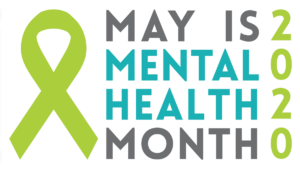
May is Mental Health Awareness Month. In this interview, Daniela Harrigan, the Director of Community Engagement for the Massachusetts Department of Mental Health (Mass DMH) will highlight mental health resources and services that librarians can share with patrons and also use themselves. Also, Daniela will share tips to support emotional wellness.

Please tell us about Mental Health Month.
Daniela Harrigan: May as Mental Health Month is a time to collectively talk about mental well-being. The observance has been celebrated since 1949 to raise awareness and to end stigma. Currently, national statistics show that 1 in 4 American adults will experience a mental health diagnosis within their lifetime. With the COVID-19 pandemic, these numbers may change as many of us are feeling distress and worry during these uncertain times. This is why it is important to connect people to resources to assist during distressful times.
What resources are available from the Massachusetts Department of Mental Health that libraries can promote on social media to celebrate Mental Health Month?
Daniela: The Massachusetts Department of Mental Health (DMH) has a number of resources. The DMH website is the primary location that connects users to an array of resources. There are resources for people within the community to learn about mental wellness and the Department and its services. The website also, includes resources for people under DMH’s care. www.mass.gov/service-details/dmh-resource-guides
A few key features on the website for the community are:
- The Community Engagement page provides opportunities for everyone to learn more and be aware of mental wellness. This can be done through community conversations, speakers, and digital media.
- Isaac’s Story is an animated film and graphic novel for elementary and middle school-aged children, shows how an honest conversation about “different kinds of hurting” between two classmates can have a lifelong effect.
- DMH Application – For people who are familiar with DMH and/or have explored the site and want to apply for DMH services, there is a page that contains eligibility information, contact information, and the application.
- Social Media – DMH uses a number of social media channels to deliver mental health information and resources. I would encourage people to follow DMH and share any content that makes sense for their location and populations.
DMH can be found on Twitter, Facebook, Instagram and LinkedIn.
DMH also has a number of resources that we partner with others to bring to the community.
- Recovery Learning Communities are consumer-run networks of self help/peer support, information and referral, advocacy, and training activities. Training in recovery concepts and tools, advocacy forums and social and recreational events are all part of what goes on in a Recovery Learning Community.
- Drop-in Access Centers offer a welcoming, staffed space where young adults with mental health needs can find supportive community, develop leadership skills, and get the help they need to pursue their life goals. Access Centers are low-barrier services (no application/service authorization needed to utilize these services) which are open to all members of the community in which they are located.
- The Network of Care is a statewide online resource providing a comprehensive, searchable directory to help Massachusetts residents find information on behavioral health services and treatment in their community. Network of Care Massachusetts includes more than 5,000 mental health, substance use, and related social services programs across the Commonwealth, providing information about locations, contact information, eligibility, and more.
I was very interested to learn about Isaac’s Story. Please tell us about Isaac’s Story and how librarians can use the book and film in virtual discussion groups.
Daniela: Isaac’s Story is a multi-media project providing elementary and middle school aged children, as well as their teachers and parents, with the language to talk about mental wellness. The goal of this project is to reduce mental health stigma and to increase friendships among children of all backgrounds.
Isaac’s Story was developed in partnership with FableVision and the Walker School, to reduce mental health stigma by providing language and resources to begin wellness conversations at an early age. The graphic novel was launched last year during the 2019 Children’s Mental Health Week, with Secretary Marylou Sudders reading the story to a group of elementary aged students in the school’s library.
There are many ways the libraries can use the resource. The easiest way during COVID-19 is to link to the website and the materials. The book, which is available as a PDF, can be used as a literary tool to encourage young readers to read. The video can accompany the PDF for readers of all abilities to read along with the print version. Also if libraries have ample resources during COVID-19, they could choose to use their own social media to host “live,” or recorded, readings of the book with prominent leaders within their communities. For example, prior to COVID-19 the Mayor of Northampton read the book to children.
As a mental wellness resource, the book provides the language to give kids to talk about how they feel. These discussions should happen with their families or other trusted adults. To help facilitate these conversations with others the books have been translated into Spanish, Haitian Creole and Cape Verdean Kriolo so far. There are also handouts and coloring pages that adults can use to encourage conversation with kids.
Also, here is a link to DMH’s One Year Anniversary of Isaac’s Story. Check it out!
This is a very stressful time for many people. What resources and do you recommend to support emotional wellness?
Daniela: First, I think it’s important to discuss the signs of distress. The signs are, and are not limited to:
- Eating or sleeping too much or too little
- Disconnecting from people, isolation and being alone
- Having low or no energy, or always tired
- Feeling like nothing matters, feeling numb, or that no one cares
- Felling worthless or like a burden to others
- Smoking, drinking, or using drugs more than usual
- Losing interest or pleasure in usual hobbies and activities
- Irritability and/or anger, easily frustrated
- Changes in sex drive
Mental health challenges can begin during childhood. Because children are still learning how to identify and talk about their thoughts and feelings, their symptoms are often displayed through changed in behavior. Symptoms in children may look like:
- Changes in school performance
- Excessive worry or anxiety, for instance fighting to avoid going to bed or school
- Overactive, restless behavior or the inability to concentrate
- Frequent nightmares
- Frequent disobedience or aggression
- Frequent temper tantrums
There are a variety of activities, services, supports, and treatments that can help balance, maintain, or improve ones mental wellness. Some of the basics are to try to:
- Focus on the positive – Its easy to focus on the negative and try shifting one’s thinking to be more mindful.
- Reduce stress – This looks different depending on what works for the individual but could include taking walks, journaling, yoga, painting, etc…
- Get good quality sleep – It is recommended that people go to bed and wake up at the same time every night and get about 6-8 hours of sleep.
- Stay connected – Connecting with others can be helpful in shifting one’s mood. During COVID-19 this may look a little less physical but can still be social through video chatting, phone calls, etc…
If these activities do not improve one’s wellbeing and the signs of distress still persist seeking additional support such as professional help may be needed for counseling, medications, and peer support.
Any other thoughts you would like to share?
Daniela: Finding help: For individuals with private insurance, contact member services, or consult with your primary care physician. The phone number should be located on the insurance card. Ask for referrals to counseling services. Individuals who do not have health insurance can obtain coverage through the MA Health Connector. For individuals insured by MassHealth (Medicaid in MA), contact the member services number on your MassHealth card, or consult with your primary care physician. For individuals insured by Medicare, contact the primary care physician’s office or Medicare for a referral to counseling services. 1.800.MEDICARE (or 1.800.633.4227). For individuals served by DMH, contact your local site office, or visit the “How to Apply for DMH Services” page.
Interview with Daniela Harrigan, Director of Community Engagement, Massachusetts Department of Mental Health (DMH)
Interviewed by Michelle Eberle, Consultant, Massachusetts Library System


